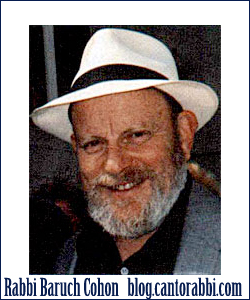BLESSINGS AND GRAMMAR –Numbers 6:22-27 – birkas cohanim – by Rabbi Baruch Cohon
Three sentences that we read in the Torah this week get repeated all the time – in Christian houses of worship, in Masonic funeral ceremonies, and most often in synagogues. We call these sentences the Priestly Benediction, and they are short, easy to remember. The first one is only 3 words long: Y’vorekh’kho Hashem v’yishm’rekho – “G-d bless you and watch over you.” This one, say the rabbis, shows the Divine blessing coming down from above. The second sentence has 5 words: Ya-er Hashem ponov eylekho vikhuneko – “G-d shine His presence to you and be kind to you.” Here the blessing comes straight forward. And the last sentence has 7 words: Yi-so Hashem ponov eylekho v’yo-sem l’kho sholom – “G-d lift His presence to you and give you peace.” Finally the blessing rises around you. So you get blessed from all directions. That’s a symbolic and encouraging thought.
But what about the grammar of this blessing? And what does grammar have to do with blessing anyway? Well, notice that the Hebrew wording is phrased in the male singular. These are the words the cohen pronounces in the synagogue, and these are the words that prompt the congregation to answer Amen. The entire congregation, not just one man! Is there some legal disclaimer here to the effect that “the male singular includes the female and includes the plural?” In a way, yes. Writing on this subject, my father of blessed memory referred back to the verse that introduces the Benediction. Num.6:23 says: “Thus shall you bless the people of Israel; say to them: G-d bless thee…” “Mark the sudden shift,” he says, “from the plural used in the introduction to the singular form of address employed throughout the benediction proper… When the priest pronounces the benediction, he is not to consider the people of Israel as broken and separate units but as an organic whole.” Klal Yisroel –total Jewry – is what we cohanim are blessing.
Nor are we the source of that blessing. An experience I will never forget is when my sons and I had the opportunity to join in the public blessing at the Western Wall in Jerusalem on the third day of Passover. People come from all over Israel for this event. We were among the last to arrive, and we found cohanim three rows deep standing along the Wall. Taking our places among the new arrivals in the outside row, we faced the Wall. Thousands of pilgrims packed in behind us. As the prayer-leader brought the service to the moment of the benediction, we pulled our taleisim (prayer-shawls) over our heads, said our prayer of thanks for being sanctified with Aaron’s holiness, and turned to face the people. From under my talis I saw the front row of worshipers just a few feet away, including one little boy about 4 who was staring at us with saucer-wide eyes. As we started to chant the blessing, his father’s hand came around and covered those eyes – mustn’t look!
Why not look? Because the cohanim are not who is blessing you. Check Num.6:27. “They will put My name on the people of Israel,” says G-d, “and I will bless them.” The cohanim form only the human conduit for the Divine message.
There is so much more of interest on this subject, that I think I’ll turn out a sequel. Meanwhile, enjoy your benediction this week for Shavuot!
You can contact Rabbi Baruch Cohon for further discussion and/or comments at: baruch.c.2011@gmail.com


